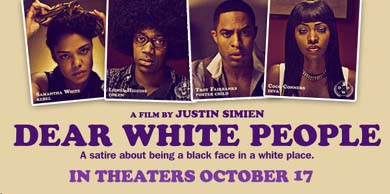L.M. KIT CARSON, 1941-2014
'DAVID HOLZMAN' ACTOR, SCREENWRITER, USA FILM FEST FOUNDER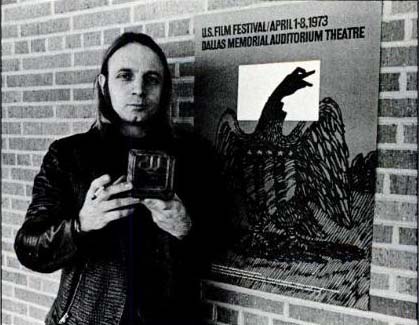 L.M. Kit Carson
L.M. Kit Carson, who portrayed the title character in
Jim McBride's
David Holzman's Diary so realistically that people thought they were watching an actual documentary, died Monday night at the age of 73, after a long illness, according to
Dallas Morning News' Robert Wilonsky.
David Holzman's Diary was a huge influence on the early work of
Brian De Palma (particularly
Greetings and
Hi, Mom!). De Palma, McBride, and producer
Charles Hirsch had all been friends prior to its completion, and Carson, who McBride credits with much of the language and ideas in the film, fell in with them, as well. From McBride's sessions with Carson, De Palma borrowed the technique of tape recording his actors as they developed their characters and created dialogue. In a passage that works as a nice tribute to Carson, McBride described the process of creating David Holzman to
Joseph Gelmis in the latter's book,
The Film Director As Superstar:
----------------------The second time around I wrote ten pages, breaking it down into scenes in which I described what happens. Sometimes I wrote some of the monologues. But it was never intended to be spoken. It was intended to be a direction the language would take.The way it actually happened was that Kit became very absorbed in the idea and really understood it very well. So we became collaborators. I didn't know it at the time, but he had been an actor and had abandoned it.
He and I spent a week together before the shooting. We sat down in a room with a tape recorder-- and I think this is the way Brian (De Palma) got the idea to do Greetings. I would say, "This is what happens in this scene. This is what I want you to say." As you know, most of the film's dialogue is in direct confrontation with the camera.
So I would tell him what I wanted and he would do it. He'd put it in his own words and throw in new things of his own. Then we'd listen to the tape together and I'd tell him: "I don't like this. You missed this. I've got an idea; put this in." He would do it again and together we refined each scene. We didn't transcribe it. We just listened to it, again and again, until we both had a fairly clear idea of what was going to happen when we were actually pointing the camera at him.
It never got down to a word by word situation. And when we started shooting it was always better than it had been in the taping sessions. He always threw in a little zinger for me that he hadn't told me about. Kit's great. We only did, at the most, two takes of any scene. As far as the camerawork is concerned, I had an absolutely clear and vivid idea of exactly what I wanted.
----------------------Carson went on to co-write McBride's 1983 remake of
Jean-Luc Godard's
Breathless,
Wim Wenders'
Paris, Texas (1984, which co-starred Carson's son, Hunter), and
Tobe Hooper's
The Texas Chainsaw Massacre 2 (1986). (The latter film starred
Dennis Hopper, who was the subject of a 1971 documentary that Carson co-directed with
Lawrence Schiller--
Matt Zoller Seitz goes into loving detail about the film in
his obituary of Carson at RogerEbert.com.) In 2003, Carson co-wrote the
Melanie Griffith-starrer
Tempo. The co-writers were
Jeremy Lipp and
Jennifer Salt.
In 1970, Carson founded, with Bill Jones, what would become the USA Film Festival in Dallas, screening films such as Woodstock and Robert Altman's M*A*S*H. Speaking with Wilonsky in a 1999 article for the Dallas Observer, Carson said, "Back in 1971, the organism started in Dallas with people who were kind of interested in movies but didn't know much about movies. There were no film fests in this country devoted to the American independent film. I said, 'There's no film festival for Marty Scorsese or Brian De Palma, so let's start one, because this stuff is happening and no one is saying this is happening.'"
An article by Gregory Curtis from the June 1973 issue of Texas Monthly (from which the photo of Carson above is taken) catches the last-minute hustle of the first (and what seems to have been the last) United States Festival, for which Carson, having been ousted as director of the USA fest, served as a "special consultant." As the fest disappoints with low attendance (despite the weeklong presence of Vincente Minelli, and other special guests such as De Palma, Salt, and Margot Kidder), Curtis portrays Carson as perpetually enthusiastic and driven to present films that might not otherwise be seen. De Palma, Salt, and Kidder were there to discuss Sisters, following an afternoon screening of the film. Carson moderated that discussion.
Curtis, who found De Palma's film "finally, too repellent to watch," writes, "Kit Carson began the discussion after the film by saying that the Hollywood system was still the most pervasive force in American filmmaking. De Palma, a man with flushed cheeks and snapping black eyes, took up this theme immediately. He didn't want to work in Hollywood. Directors like Francis Copolla (The Godfather) and Peter Bogdanovich (The Last Picture Show) thought they could maintain their integrity while working there. 'But I don't think you can get in bed with the devil,' De Palma said, 'without having some of it rub off.'"
On his Facebook page yesterday, Paul Schrader wrote, "Kit was among the first 'film' people I knew after coming to LA in 68. We gravitated toward each other. In Feb 1971 (right after the San Fernando Valley earthquake) he invited me to be on the jury (I was critic for LA Free Press at the time) of the first USA film festival in Dallas. Other jury members included Andy Sarris, Manny Farber, Dwight McDonlald, P Adams Sitney, [Rex] Reed, Jay Cocks, Roger Ebert and others I can't remember at the moment. In that week it felt a mission and sense of belonging like never before. Happy Trails, old Pard."
In an article Carson wrote for Film Comment about being asked by Hooper to work on The Texas Chainsaw Massacre 2, Carson writes about trying to make it through the first Texas Chainsaw Massacre. "I first squirmed through it back in 1975 in a tiny, dumpy screening room just below Sunset Boulevard. I was newly exiled from Texas and had known Tobe Hooper as a good documentary filmmaker (Peter, Paul, and Mary in Concert, 71) in Austin but had no way to be prepared for the bite of The Saw. I flat couldn’t take it—neither could Paul Schrader, a curious friend who’d come along to the screening; about midway through the movie we buzzed the projectionist to skip a couple of reels and just show us the end. Whu: this sucker could really hurt you. Post-screening, blinking in the daylight leaning on our cars, Schrader and I tried to figure out what we’d run into."
Wes Anderson and Owen Wilson, who were mentored by Carson early in their careers, have written a tribute to Carson at RogerEbert.com. Jeffrey Wells has also posted some remembrances at Hollywood Elsewhere.
 Last month, I posted a link to Austin Garrick's top 10 Criterion releases, which included Brian De Palma's Blow Out. Earlier this week, Entertainment Weekly posted a playlist created by Electric Youth, the Toronto duo made up of Garrick and Bronwyn Griffin. Their collaboration with College, "A Real Hero," was used prominently in Nicholas Winding Refn's Drive. They couldn't help but cap off their playlist with that track, but they also included a couple of tracks from De Palma films-- here are those two choices, with the duo's comments:
Last month, I posted a link to Austin Garrick's top 10 Criterion releases, which included Brian De Palma's Blow Out. Earlier this week, Entertainment Weekly posted a playlist created by Electric Youth, the Toronto duo made up of Garrick and Bronwyn Griffin. Their collaboration with College, "A Real Hero," was used prominently in Nicholas Winding Refn's Drive. They couldn't help but cap off their playlist with that track, but they also included a couple of tracks from De Palma films-- here are those two choices, with the duo's comments:



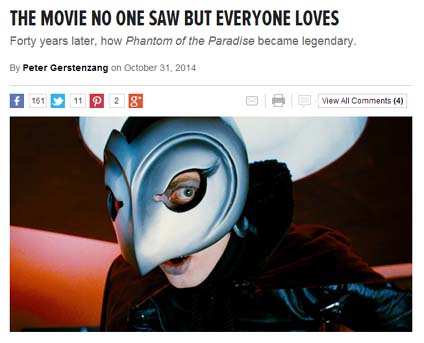 Brian De Palma's Phantom Of The Paradise was released in theaters 40 years ago today.
Brian De Palma's Phantom Of The Paradise was released in theaters 40 years ago today. 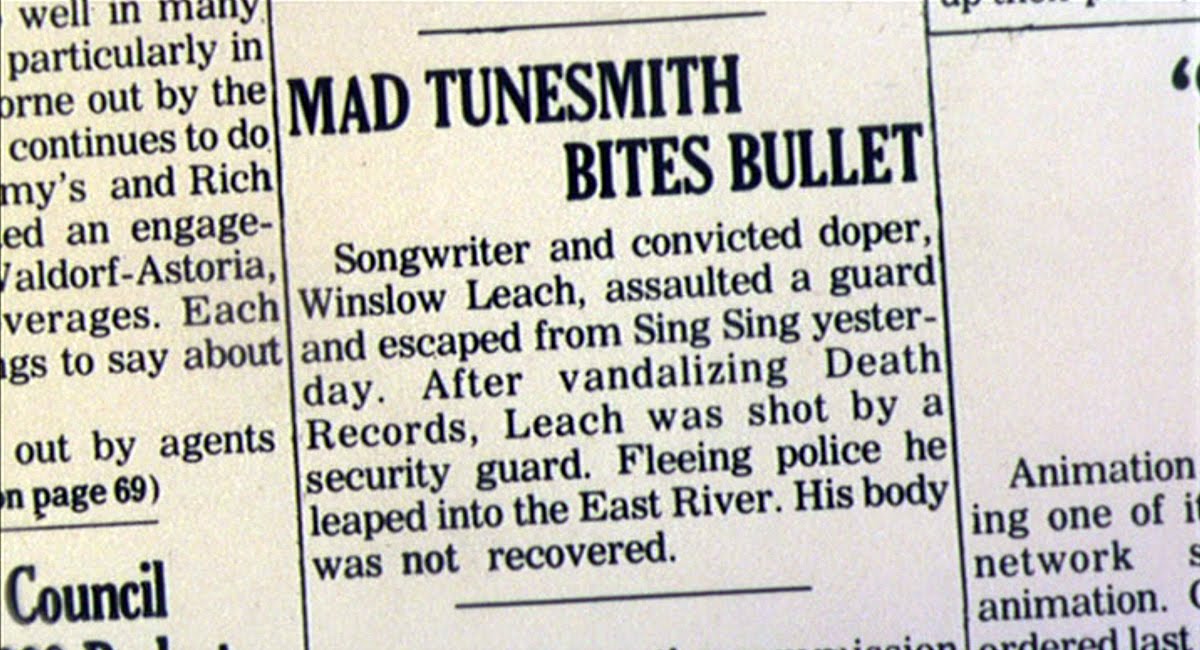
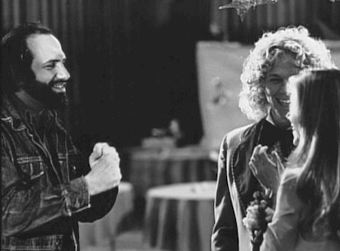 A day after I
A day after I 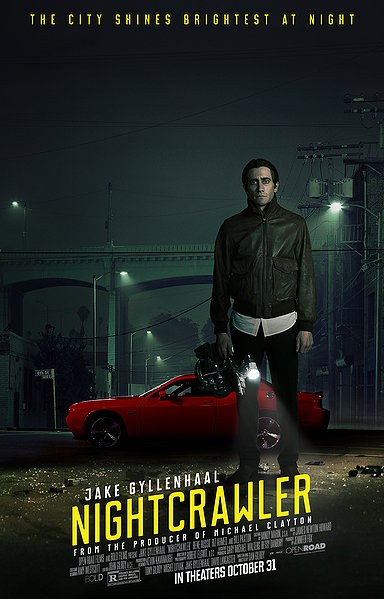
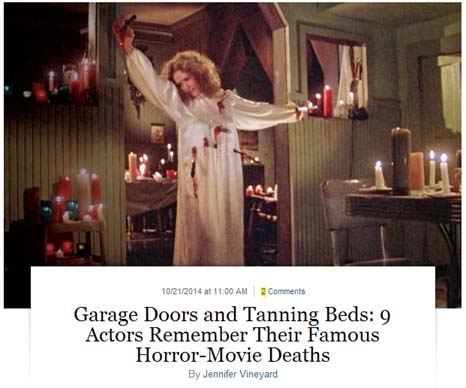 It's Halloween season, which means it's time for Carrie discussions and screenings all over the place. At
It's Halloween season, which means it's time for Carrie discussions and screenings all over the place. At  L.M. Kit Carson, who portrayed the title character in Jim McBride's David Holzman's Diary so realistically that people thought they were watching an actual documentary, died Monday night at the age of 73, after a long illness, according to
L.M. Kit Carson, who portrayed the title character in Jim McBride's David Holzman's Diary so realistically that people thought they were watching an actual documentary, died Monday night at the age of 73, after a long illness, according to  Damien Chazelle, who
Damien Chazelle, who 